09 Apr 18 | Azerbaijan, Azerbaijan News, Germany, Mapping Media Freedom, Media Freedom, media freedom featured, News and features, Russia, Turkey, Uzbekistan
[vc_row][vc_column][vc_column_text]
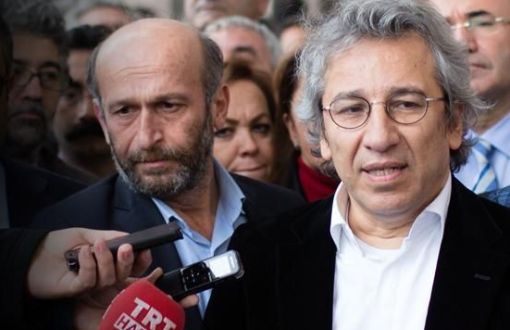
Journalists Erdem Gül and Can Dündar (Photo: Bianet)
Can Dündar, editor-in-chief of Cumhuriyyet, one of Turkey’s most popular newspapers, was awaiting an appeal on his case in Turkey from Germany when the news of the coup d’etat in his homeland came. Scores of arrests followed, and his lawyer advised that Dündar, who had just narrowly escaped an assassination attempt in May 2016 outside a courtroom and was facing over five years in prison for allegedly leaking state secrets, stay in Germany.
He recalls that it was the hardest decision in his life, 40 years of which he had devoted to working as a journalist in Turkey.
“I thought it was impossible to go back, decided to stay and work from Germany, and about a year ago I with a small team started a media organization here, Özgürüz.”
When it’s time to leave
As shocking as Dündar’s story is, it is hardly unusual in the Eurasian region, where, according to International Media Support, there was a steady decline in freedom of expression in Eurasia since 2011. While for years the Committee to Protect Journalists named Turkey the biggest jailer of journalists globally, there are other nations competing for this dubious title.
For some journalists, the alternative to being jailed is an exile. According to Yavuz Baydar, chief editor of Ahval Online, a Turkey-oriented news site based in Germany, “That’s an inevitable result of oppression in any country because as long as the conventional media are suffocated and put under the yoke of the powers, it leaves journalists with no other choice than leaving the profession altogether or moving abroad.”
However, only a select few survive the shock and reemerge as viable journalists continuing to work in exile.
Some of the most successful examples of the media in exile emerged from the region and operating in the more permissive environment of Western Europe, according to Jens Uwe Thomas with RSF Germany, are Meduza, Amurburg and Spektr, Russia-oriented news portals, as well as MeydanTV, an Azerbaijani multimedia outlet in exile, Dündar’s Özgürüz and Baydar’s Ahval Online.
Challenges of exile
Thomas says that upon settling in exile, the first step for the journalists is usually to legalize their status, and then they start looking for opportunities to establish their outlets.
“The most important thing is to support these media abroad in terms of their registration,” says Bektour Iskander, editor of Kyrgyz media Kloop, who monitors exiled media and is in the process of creating a digital resources kit for them, adding that oftentimes, the media can’t relocate abroad due to lack of financial resources or visas.
“In 2010 we were threatened by the special services because of our investigative reporting about the son of president Bakiyev [of Kyrgyzstan]. But we had no opportunity to leave the country. Only now I realize that we were facing scary consequences, even assassination. We were so clueless as to how to do that, or find the resources for that, we were saved by the miracle, a revolution happened in the country and the threat disappeared,” he recalls.
One common thread for these media across the board is that while their editorial teams operate in exile, they have networks of journalists working for them from inside their home country, says Thomas, adding that secure communication and creating collaborative work environment in such circumstances is often a challenge.
“Those are operating under the great risks, which causes a lot of hurdles and obstacles for continuity and consistency in the content quality,” Baydar adds. MeydanTV founder Emin Milli agrees, “Unfortunately, journalists and their family members are under pressure. The ones who work with us have been attacked, some tortured. Some parents of theirs were fired”. Galima Bukhabrayeva, former editor of exiled Uznews web site that was allegedly hacked by the Uzbek government and is now defunct, says: “In our case, the best journalists in Uzbekistan worked with us, because in our case it wasn’t enough to be a journalist, one had to be a patriot and a citizen, and a brave person, at that.”
But the relocation doesn’t always pose a challenge, says Aleksandr Kushnar, editor of Russian exiled media Amurburg. Commenting on the success of Meduza, he says, “It makes more sense for them to be located where they are for the reasons of safety of the editorial staff [because] their geographic location doesn’t affect the quality of their content.”
Uniformly, the exiled media representatives bemoan the perception in their home countries that these media lack the situational awareness on the ground. One example of successfully solving this challenge is MeydanTV, says Iskander, adding that “they encourage citizen journalism, their readers [are] often involved in the content creation, they send photos, videos, materials.”
Another challenge all of the exiled media managers interviewed for this article cite is the lack of funding, which poses a constant problem on the back of everybody’s mind. What complicates things for the managers of these outlets is the stipulation set forward by the international donors that the medium be located in-country in order to satisfy the funding criteria, which is impossible to abide by for those operating in exile.
Silver linings
But not all is hopeless for the uprooted journalists and media managers, and alongside obvious challenges, there are reasons for cautious optimism. There are quite a few success stories among the outlets who learned to capitalise on the advantages of operating from free environments.
Kushnar says attaining success is very difficult in reality, and he attributes it to the issues of funding, resources and teams. Speaking of the outlets, he says that “Their capabilities are seriously restricted. Oftentimes, they cannot compete with the leading news agencies that are funded very generously. We all know very well how RT is funded all over the world. The goal for these media is to identify the niches where they still can get in and tell the truth. It’s very difficult when pro-Kremlin outlets have an audience of 40 million, and your budget is a thousand times smaller.”
The upsides are quite self-evident, according to Anton Lysenkov, editor of Latvia-based Spektr: “Our situation is beneficial. We are not subjected to constant audits and provocations. Our work environment is much more peaceful. I admire those who continue to work from Russia, and we are trying to help them,” he adds.
According to Baydar, “The upside is you can see everything with a bird’s eye, in a free domain, analyse things much more clearly in a macro way which gives a lot of advantages to focus on the main areas that need to be covered.”
Some media in exile not only survive, but they manage to thrive and even increase their audiences, like Meduza. “They have millions of unique visitors a month, and it’s been rising year to year. They’re trusted,” says Milli. “They can work freely in Russia and come and go as they please. They’re a successful model.”
Galina Timchenko, Meduza’s editor-in-chief, cannot attribute the success of her outfit to any one strategy: “Unfortunately, there are no long-term plans and effective strategies for success in the current political climate. So far, we are not considering the possibility of moving to Russia because we cannot remain oblivious to the rising risks in that case. The media market in Russia is almost completely controlled by the state, and we don’t see a place for ourselves within such a market in the short term perspective,” she adds.
Preserving and rehearsing for the return
But what is the purpose of the media in exile and what is their end game?
While Kushnar says, exiled media preserve the freedom of the press in a dictatorship, Lysenkov adds that their goal is to supply the population with propaganda-free and less emotionally-charged content. Milli sees the enormous power of the free media to change the society for the better. “People have big hopes and need this, too. That’s why we keep working”.
Others see their ultimate goal as return home. Iskander cautions that “when a dictatorship in their home country comes to an end and [the media in exile] return home, their ratings start falling sharply. Because the credit of trust has been disintegrating, because the rhetoric could change from “at least someone is trying to do some good, even if it is from abroad” to “where have you been all these years while we were suffering?”
Despite such dangers, Bukharbayeva says, the ultimate goal of the exiled media is the return home. She points out that one loses focus and ability to write accurately when unable to visit their home country for over a decade, but “exiled media cannot exist indefinitely, and we must try to return because the time has come.”
Dündar, who has also started publishing a print magazine and opened a publishing house, is looking into opening a TV channel. He says his team’s current work is like a rehearsal in preparations for the future.
“It’s impossible to be in Turkey. But like the German Jews in WWII [who] came to Turkey, rehearsed there, came up with new ideas, and then went back to Germany after the war, we, Turks, are rehearsing and preparing for a better day in Turkey to return there”. [/vc_column_text][/vc_column][/vc_row][vc_row][vc_column][vc_basic_grid post_type=”post” max_items=”10″ grid_id=”vc_gid:1523289736466-bd3f6e90-fdac-9″ taxonomies=”8607″][/vc_column][/vc_row]
09 Apr 18 | Index in the Press
In extraordinary public appeal, Denver Post’s “News Matters” report on its own fate shows readers how far-away hedge fund investors demanding greater profits can decimate local information sources. Read the full article.
09 Apr 18 | Index in the Press
Bringing curbs against the press, which peers have tried to tag on to the Data Protection Bill, would have dire consequences for the Scottish newspaper industry, MPs have been told. Read the full article.
09 Apr 18 | Index in the Press
Seven years ago this month, human rights activists Abdulhadi Al-Khawaja was taken from his home in Bahrain, tortured, tried in a military court, and sentenced to life in prison for taking part in peaceful protests. He has undertaken a number of hunger strikes to protest against his torture and poor prison conditions. Read the full article.
09 Apr 18 | Awards, Fellowship, Fellowship 2018, News and features
[vc_row][vc_column][vc_column_text]Wendy Funes is an investigative journalist from Honduras who regularly risks her life for her right to report on what is going on in the country.
She is a courageous female voice, writing in a violent and corrupt society where two journalists have been killed this year and where women are regularly subjected to severe domestic violence and often killed.
Funes is an inventive and passionate human rights reporter. For one article she got her own death certificate issued so that she could show up the corruption in the civil registration office. For another she dressed as a beggar for an investigation into children being forced to beg on the streets of the country’s capital.
She writes about violence against women, a huge problem in Honduras where one woman is killed every 16 hours, and the number of women killed has increased by more than 260% between 2005 and 2013.
But Funes is also an activist for her profession, which led to her being expelled from the journalism trade union where she had been fighting for labour rights and freedom of expression.
“I have overcome many traumas, including the violent deaths of my father and several friends and fellow journalists, for which no one has been brought to justice,” said Funes. “I will not succumb to despair – every blow has made me a warrior, and every obstacle is a chance to prove that adversity must never stop us. Only those who has suffered dark will search for the light. My way to achieve my life’s purpose is the journalism I love, which quickens my heart in moments of greatest expectation, which brings joy and sorrow. Through independent, self-critical, methodical journalism – the kind that comes from the streets – combined with an academic grounding, I am convinced I can bring change to my country.”
Working for C-Libre, a freedom of expression organisation in Honduras, she highlighted the continued murder of journalists by organising a march which she called the Demonstration of Silence to protest the death of journalists. Protesters carried white cardboard coffins with the faces of each of the journalists on them to the prosecutors’ office in the capital Tegucigalpa.
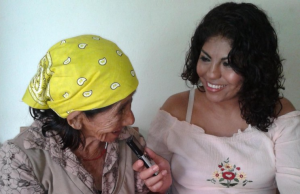
In 2017 Wendy Funes was helped by PressStart, a global crowdfunding platform for reporters in countries where the press cannot report freely, to write an expose of gang rapes of indigenous Lenca women in the La Paz area of Honduras.
On May 31, 2017 Funes retired from C-Libre to found her own research newspaper and promote investigative journalism in her country, using data with a gendered approach and promoting transparency and access to public information.
“This nomination is like an embrace of trust in the darkness of death and risk implied by the asphyxiating level of censorship that the press experiences in Honduras,” said Funes. “It’s like a hand reaching out to me to tell me it’s worth resisting this corrupt and unfair system.”
See the full shortlist for Index on Censorship’s Freedom of Expression Awards 2018 here.
[/vc_column_text][vc_row_inner][vc_column_inner][vc_column_text]
Wendy Funes y su valiente defensa del periodismo de investigación en Honduras
Wendy Funes es una periodista de investigación hondureña que pone su vida en peligro con regularidad: es el precio que paga a cambio de su derecho a informar sobre lo que está pasando en el país.
Es la valerosa voz de una mujer escribiendo en una sociedad violenta y corrupta, en la que dos periodistas han sido asesinados en lo que va de año. Un país en el que las mujeres sufren violencia doméstica extrema a diario y son a menudo asesinadas.
Funes es una reportera pro derechos humanos ingeniosa y apasionada. Hizo que expidieran su propio certificado de defunción para desvelar en un artículo la corrupción del registro civil. Para otro reportaje, se disfrazó de pordiosera para investigar sobre los niños forzados a mendigar en las calles de la capital del país.
Escribe sobre la violencia contra las mujeres, un problema gravísimo en Honduras, donde matan a una mujer cada 16 horas y la cifra de asesinadas se incrementó más de un 260% entre 2005 y 2013.
Funes también es una activista dentro de su profesión, razón por la cual fue expulsada del sindicato de periodismo desde el que había estado luchando por los derechos laborales y la libertad de expresión.
«He superado muchos traumas, entre ellos, las muertes violentas de mi padre y de varios amigos y compañeros periodistas, por las cuales nadie ha sido llevado ante la justicia», declaró Funes. «No sucumbiré a la desesperación: cada golpe me ha hecho una guerrera, y cada obstáculo no es más que una oportunidad de demostrar que la adversidad nunca debe detenernos. Solo quienes han sufrido la oscuridad buscarán la luz. El modo que tengo para cumplir mi propósito en la vida es el periodismo al que amo, el que hace que se me acelere el corazón en momentos de inmensa esperanza, el que me trae alegrías y tristezas. Con periodismo independiente, autocrítico, metódico —el tipo de periodismo que viene de las calles—, combinado con conocimientos académicos, estoy convencida de que puedo traer el cambio a mi país».
Cuando trabajaba para C-Libre, una organización por la libertad de expresión en Honduras, organizó una marcha a la que llamó la Manifestación del Silencio en protesta contra los continuos asesinatos de periodistas. Los manifestantes cargaron con ataúdes de cartón blanco con retratos de cada uno de los periodistas asesinados hasta la fiscalía de la capital, Tegucigalpa.
En 2017 Wendy Funes recibió apoyo de PressStart, una plataforma de crowdfunding global para reporteros en países donde la prensa no puede informar libremente, con el cual escribió un reportaje destapando las violaciones grupales de mujeres indígenas lencas en la zona hondureña de La Paz.
El 31 de mayo de 2017, Funes se retiró de C-Libre para fundar su propio periódico de investigación y promover este tipo de periodismo en su país, promoviendo la utilización de los datos desde una perspectiva de género, la transparencia y el acceso a información pública.
«Esta nominación es como un abrazo de confianza en la oscuridad de la muerte y el peligro implícitos en el asfixiante nivel de censura que vive la prensa en Honduras», declaró Funes. «Es como si me hubieran extendido una mano para decirme que merece la pena resistir a este sistema corrupto e injusto».
Traducción de Arrate Hidalgo
Accede a la lista completa de nominados a los Index on Censorship’s Freedom of Expression Awards 2018 aquí.[/vc_column_text][/vc_column_inner][/vc_row_inner][/vc_column][/vc_row][vc_row full_width=”stretch_row_content” equal_height=”yes” el_class=”text_white” css=”.vc_custom_1490258749071{background-color: #cb3000 !important;}”][vc_column width=”1/2″][vc_custom_heading text=”Support the Index Fellowship.” font_container=”tag:p|font_size:28|text_align:center” use_theme_fonts=”yes” link=”url:https%3A%2F%2Fwww.indexoncensorship.org%2Fnewsite02may%2Fsupport-the-freedom-of-expression-awards%2F|||”][vc_column_text]
By donating to the Freedom of Expression Awards you help us support
individuals and groups at the forefront of tackling censorship.
Find out more
[/vc_column_text][/vc_column][vc_column width=”1/2″ css=”.vc_custom_1521479845471{background-image: url(https://www.indexoncensorship.org/newsite02may/wp-content/uploads/2017/05/2017-awards-fellows-1460×490-2_revised.jpg?id=90090) !important;background-position: center !important;background-repeat: no-repeat !important;background-size: cover !important;}”][/vc_column][/vc_row][vc_row][vc_column][vc_basic_grid post_type=”post” max_items=”4″ element_width=”6″ grid_id=”vc_gid:1523261771179-2e70bbac-7a3c-3″ taxonomies=”10735″][/vc_column][/vc_row]
06 Apr 18 | Volume 47.01 Spring 2018, Volume 47.01 Spring 2018 Extras
[vc_row][vc_column][vc_column_text][/vc_column_text][/vc_column][/vc_row][vc_row][vc_column][vc_column_text]
The spring 2018 issue of Index on Censorship magazine takes a special look at the abuse of history and how governments and powers alike are manipulating the past across the globe.
In this podcast, we speak with historian Rana Mitter about China’s current historical narrative, broadcaster and historian Bettany Hughes about how memory affects history and giving Cleopatra her dues, as well Omar Mohammed, the man behind Mosul Eye, about the dangers of recording history under Isis.
Print copies of the magazine are available on Amazon, or you can take out a digital subscription via Exact Editions. Copies are also available at the BFI, the Serpentine Gallery, MagCulture, (London), News from Nowhere (Liverpool), Home (Manchester). Each magazine sale helps Index on Censorship continue its fight for free expression worldwide.
[/vc_column_text][/vc_column][/vc_row][vc_row][vc_column width=”1/3″][vc_custom_heading text=”The Abuse of History”][vc_column_text]The spring 2018 issue of Index on Censorship magazine takes a special look at how governments and other powers across the globe are manipulating history for their own ends
With: Simon Callow, David Anderson, Omar Mohammed [/vc_column_text][/vc_column][vc_column width=”1/3″][vc_single_image image=”99222″ img_size=”medium”][/vc_column][vc_column width=”1/3″][vc_custom_heading text=”Subscribe”][vc_column_text]In print, online. In your mailbox, on your iPad.
Subscription options from £18 or just £1.49 in the App Store for a digital issue.
Every subscriber helps support Index on Censorship’s projects around the world.
 SUBSCRIBE NOW[/vc_column_text][/vc_column][/vc_row]
SUBSCRIBE NOW[/vc_column_text][/vc_column][/vc_row]
06 Apr 18 | Awards, Fellowship 2018, News and features
[vc_row][vc_column][vc_video link=”https://youtu.be/Kuztv8blNgY”][vc_column_text]
Mèdia.cat is a Catalan website devoted to highlighting media freedom violations and investigating under-reported or censored stories. Unique in Spain, it has been a particularly significant player in the last year when the heightened atmosphere in Catalonia over the disputed October independence referendum has brought issues of censorship and the impartiality of news, as well as the actions of public bodies like the police and government, under the spotlight.
Without the website, there would have been no online platform to catalogue systematically, publicly and in real time censorship perpetrated by the Spanish authorities against the local Catalan population. One of its most high-profile initiatives has been its Map on Censorship. This was set up two years ago in response to the Spanish government approving a so-called gag law, limiting the right to protest and effectively stopping people filming police officers. The Map on Censorship website was used particularly effectively during the 2017 crisis over the Catalan referendum campaign, giving the population in Catalonia live information about censorship, and other violations.
Between September and November 2017 as part its Map on Censorship initiative, journalists at Mèdia.cat documented and raised awareness about more than 125 possible restrictions on freedom of expression or information. All the incidents were related to the independence referendum in Catalonia of 1 October 2017, including both the lead up to the poll and its aftermath. The site deployed a team of 11 volunteer journalists to provide live updates on media freedom violations. The crisis in Catalonia in the last few months increased the reach and significance of the Map on Censorship with the map having 55,523 visits from 1 January to 12 November 2017.
Mèdia.cat describes itself as a critical media watchdog. It is run by a group of local Catalan journalists and publishes in Catalan about Catalonia. The financing for Mèdia.cat projects comes from a variety of sources including grants from the Catalan local government and the Barcelona City Council, crowdsourcing, foundations and donations. Mèdia.cat maintains its independence and is part of the Ramon Barnils group of journalists.
Mèdia.cat’s Hate Speech Media Watchdog ( https://www.media.cat/discursodimitjans/) also identified eight far-right media outlets in Spain which use fake news and other strategies to spread racism, xenophobia and islamophobia, among other forms of discrimination.
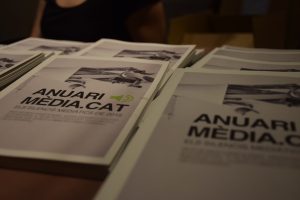
On their spot on the 2018 shortlist, Journalist at Mèdia.cat said “It is a great honor to be nominated to the Freedom of Expression awards. We were inspired by Index on Censorship’s work when we launched our Map on Censorship in 2015, which nowadays has become one of our most relevant projects. The nomination itself feels like an award for us. Especially in the current context, where freedom of expression is at stake in Catalonia and the Spanish state. Journalists have suffered physical aggressions, threats and other restrictions to their jobs, some artists have been censored and even retweeting a critical message can get you accused. We need to fight against this situation, unique in Western Europe, and this nomination is a great encouragement to do so.”
See the full shortlist for Index on Censorship’s Freedom of Expression Awards 2018 here.[/vc_column_text][/vc_column][/vc_row][vc_row full_width=”stretch_row_content” equal_height=”yes” el_class=”text_white” css=”.vc_custom_1490258749071{background-color: #cb3000 !important;}”][vc_column width=”1/2″][vc_custom_heading text=”Support the Index Fellowship.” font_container=”tag:p|font_size:28|text_align:center” use_theme_fonts=”yes” link=”url:https%3A%2F%2Fwww.indexoncensorship.org%2Fnewsite02may%2Fsupport-the-freedom-of-expression-awards%2F|||”][vc_column_text]
By donating to the Freedom of Expression Awards you help us support
individuals and groups at the forefront of tackling censorship.
Find out more
[/vc_column_text][/vc_column][vc_column width=”1/2″ css=”.vc_custom_1521479845471{background-image: url(https://www.indexoncensorship.org/newsite02may/wp-content/uploads/2017/05/2017-awards-fellows-1460×490-2_revised.jpg?id=90090) !important;background-position: center !important;background-repeat: no-repeat !important;background-size: cover !important;}”][/vc_column][/vc_row][vc_row][vc_column][vc_basic_grid post_type=”post” max_items=”4″ element_width=”6″ grid_id=”vc_gid:1522918006370-df72cba5-2f37-3″ taxonomies=”10735″][/vc_column][/vc_row]
05 Apr 18 | Events
[vc_row][vc_column][vc_single_image image=”99371″ img_size=”full” alignment=”center” onclick=”custom_link” link=”https://www.hayfestival.com/m-127-hay-festival-2018.aspx?skinid=1¤cysetting=GBP&localesetting=en-GB&resetfilters=true”][vc_column_text]
CAMBRIDGE SERIES 4: DIGITAL FAKERY AND ITS CONSEQUENCES
Saturday 26 May 2018, 1pm Venue: Good Energy Stage
Tickets: £7 from the Hay Festival
Drawing on her research about human rights reporting in the digital age, the Co-Director of the Centre of Governance and Human Rights at the University of Cambridge argues that digital fakery’s consequences for democracy arise not because we are duped, but because of what we do to not be duped. Chaired by Rachael Jolley, editor of Index on Censorship.
Ella McPherson, Rachael Jolley[/vc_column_text][vc_row_inner][vc_column_inner width=”1/3″][vc_single_image image=”90098″ add_caption=”yes” alignment=”center”][/vc_column_inner][vc_column_inner width=”1/3″][vc_single_image image=”99366″ add_caption=”yes” alignment=”center”][/vc_column_inner][vc_column_inner width=”1/3″][/vc_column_inner][/vc_row_inner][vc_column_text]
THE DEATH OF DAPHNE CARUANA GALIZIA AND THE TRUTH ABOUT MALTA
Monday 28 May 2018, 10am Venue: Starlight Stage
Tickets: £8 from the Hay Festival
The journalist Daphne Caruana Galizia investigated corruption in the Maltese government for decades in the face of intimidation, libel threats and persecution. She was assassinated in a car bomb attack on 16 October 2017. The editor of Index on Censorship is joined by Daphne’s son Paul and her fellow Maltese journalist Caroline Muscat of The Shift News. They talk to the BBC’s Europe Editor.
Rachael Jolley, Paul Caruana Galizia, Caroline Muscat with Katya Adler[/vc_column_text][vc_row_inner][vc_column_inner width=”1/3″][vc_single_image image=”90098″ add_caption=”yes” alignment=”center”][/vc_column_inner][vc_column_inner width=”1/3″][vc_single_image image=”99367″ add_caption=”yes” alignment=”center”][/vc_column_inner][vc_column_inner width=”1/3″][vc_single_image image=”99368″ add_caption=”yes” alignment=”center”][/vc_column_inner][/vc_row_inner][vc_row_inner][vc_column_inner width=”1/3″][vc_single_image image=”99369″ add_caption=”yes” alignment=”center”][/vc_column_inner][vc_column_inner width=”1/3″][/vc_column_inner][vc_column_inner width=”1/3″][/vc_column_inner][/vc_row_inner][/vc_column][/vc_row]
05 Apr 18 | News and features, Volume 47.01 Spring 2018 Extras
[vc_row][vc_column][vc_row_inner][vc_column_inner][vc_column_text]
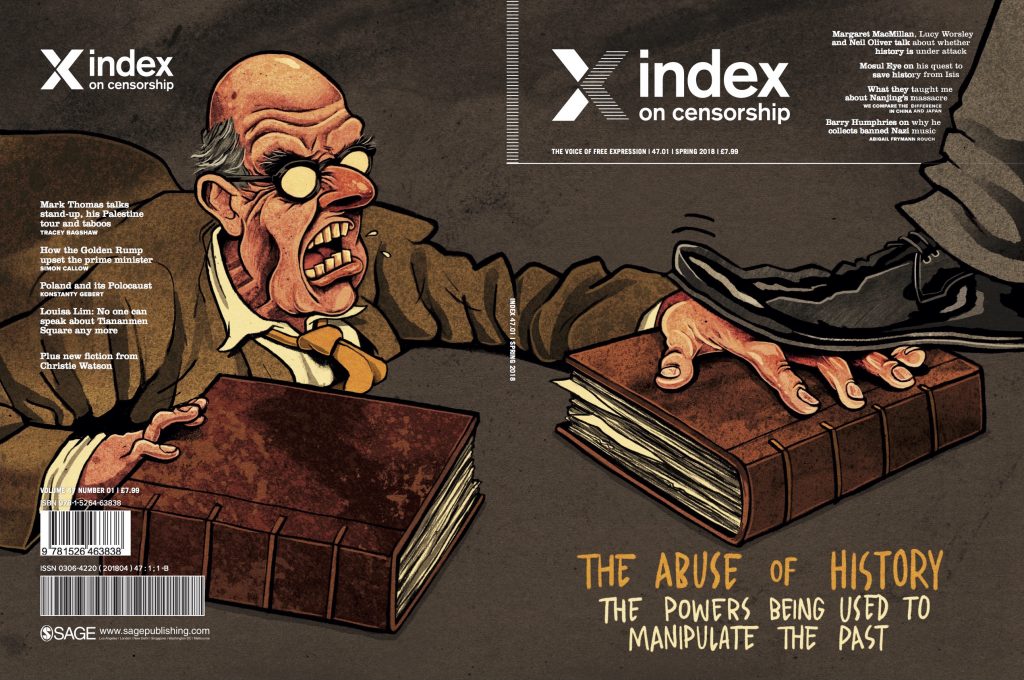
The spring 2018 issue The Abuse of History focuses on governments and powers alike manipulating history across the globe.
[/vc_column_text][/vc_column_inner][/vc_row_inner][/vc_column][/vc_row][vc_row][vc_column][vc_column_text]
In the spring 2018 issue of Index on Censorship magazine, we feature a special report on The Abuse of History, focusing on how governments and powers alike across the globe are manipulating history. See how brainy you are by taking our quiz, based on articles featured in the magazine.
[streamquiz id=”1″] Click on the square button.[/vc_column_text][vc_separator][/vc_column][/vc_row][vc_row content_placement=”top”][vc_column width=”1/3″][vc_custom_heading text=”The Abuse of History” font_container=”tag:p|font_size:24|text_align:left” link=”url:https%3A%2F%2Fwww.indexoncensorship.org%2Fnewsite02may%2F2017%2F12%2Fwhat-price-protest%2F|||”][vc_column_text]The spring 2018 issue of Index on Censorship magazine takes a special look at how governments and other powers across the globe are manipulating history for their own ends
With: Simon Callow, David Anderson, Omar Mohammed [/vc_column_text][/vc_column][vc_column width=”1/3″][vc_single_image image=”99085″ img_size=”medium” alignment=”center” onclick=”custom_link” link=”https://www.indexoncensorship.org/newsite02may/2017/12/what-price-protest/”][/vc_column][vc_column width=”1/3″ css=”.vc_custom_1481888488328{padding-bottom: 50px !important;}”][vc_custom_heading text=”Subscribe” font_container=”tag:p|font_size:24|text_align:left” link=”url:https%3A%2F%2Fwww.indexoncensorship.org%2Fnewsite02may%2Fsubscribe%2F|||”][vc_column_text]In print, online. In your mailbox, on your iPad.
Subscription options from £18 or just £1.49 in the App Store for a digital issue.
Every subscriber helps support Index on Censorship’s projects around the world.
 SUBSCRIBE NOW[/vc_column_text][/vc_column][/vc_row]
SUBSCRIBE NOW[/vc_column_text][/vc_column][/vc_row]
05 Apr 18 | Index in the Press
Abdulhadi Al-Khawaja is an internationally-known Bahraini-Danish human rights defender who is the founder and former President of the Bahrain Centre for Human Rights (BCHR), established in 2002, and a Founding Director of the Gulf Centre for Human Rights (GCHR), established in 2011. He was Middle East and North Africa Protection Coordinator for Front Line Defenders until February 2011, when he resigned during the popular movement in Bahrain. Read the full article.
05 Apr 18 | Awards, Fellowship, Fellowship 2018, News and features
[vc_row][vc_column][vc_video link=”https://youtu.be/qqxJndjCWmg”][vc_column_text]
Launched in 2016, Habari RDC is a collective of more than 100 young Congolese bloggers and web activists, who use Facebook, Twitter and YouTube to give voice to the opinions of young people from all over the Democratic Republic of Congo.
The aim of these citizen bloggers is to bear witness to what is happening in every corner of the country, which is plagued by extreme poverty, corruption, and violence.
Congo has been racked by civil war for the last 20 years. According to the International Red Cross, Congo had almost a million new displacements in 2016 because of conflict and armed attacks — the highest in the world.
The population is also overwhelmingly young. Some 64% of the population in Congo are under 24 and 42.2% under 14. Average life expectancy for men is 47 and 51 for women. The country also receives little international coverage. Newspapers within the country are controlled by political factions, and up until now, radio has been the most reliable source of information.
Against this background, Habari RDC is an incredibly ambitious project led by young, digitally savvy and opinionated Congolese men and women with a belief in free expression and non-violence. For the last year, they have been using the internet and all the technology at their disposal to talk about what their country is really like and how they would like it to be.
“We want to create a society in which young people are tolerant of each other. In which young people are not manipulated by politicians for their personal interests, because young people represent hope for the country. In our societies, young people are unfortunately used and set against each other to serve egotistical old people.We fight for human rights and the participation of young people in the running of the country. We dream of a young president who will work for the country and not a young egoist.” Habari creators told Index.
The site posts stories and cartoons about politics, but it also covers football, the arts and subjects such as domestic violence, child exploitation, the female orgasm, and sexual harassment at work. It is funny, angry, modern: a collection of irreverent, young distinctive Congolese voices, demanding to be heard in the world.
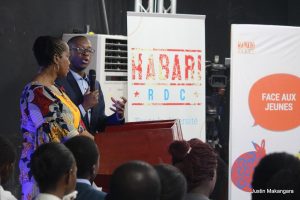
Habari has grown and expanded into an established blogging site and source of activism during 2017, covering a wide range of social and political issues. One of its achievements was encouraging voter registration in Walikale Territory where, in the past, not only has registration been low, but people have disappeared from the register. This eastern part of the country is also very cut off. Habari wrote an article about this on their blogging site and as a result, they reported, a local MP put pressure on the government. In the end, according to Habari, 290,000 people there were registered to vote, including 140,000 women. They also help individuals – for instance raising the plight of a woman who was raped and rejected by her family. And have reported on the suppression of the internet; and the use of road taxes to arm militias.
On their nomination for the Index Awards, Habari creators said, “This award represents for us two things at once: the great honor of a recognition of the work of 100 young Congolese bloggers from 100 different corners of the DRC who want to change the living conditions of their peers by raising their voices thanks to internet . But this award is also a challenge to do more.”
See the full shortlist for Index on Censorship’s Freedom of Expression Awards 2018 here.[/vc_column_text][/vc_column][/vc_row][vc_row full_width=”stretch_row_content” equal_height=”yes” el_class=”text_white” css=”.vc_custom_1490258749071{background-color: #cb3000 !important;}”][vc_column width=”1/2″][vc_custom_heading text=”Support the Index Fellowship.” font_container=”tag:p|font_size:28|text_align:center” use_theme_fonts=”yes” link=”url:https%3A%2F%2Fwww.indexoncensorship.org%2Fnewsite02may%2Fsupport-the-freedom-of-expression-awards%2F|||”][vc_column_text]
By donating to the Freedom of Expression Awards you help us support
individuals and groups at the forefront of tackling censorship.
Find out more
[/vc_column_text][/vc_column][vc_column width=”1/2″ css=”.vc_custom_1521479845471{background-image: url(https://www.indexoncensorship.org/newsite02may/wp-content/uploads/2017/05/2017-awards-fellows-1460×490-2_revised.jpg?id=90090) !important;background-position: center !important;background-repeat: no-repeat !important;background-size: cover !important;}”][/vc_column][/vc_row][vc_row][vc_column][vc_basic_grid post_type=”post” max_items=”4″ element_width=”6″ grid_id=”vc_gid:1522917883563-1453e0af-5b06-2″ taxonomies=”10735″][/vc_column][/vc_row]
05 Apr 18 | Bahrain, Bahrain Statements, Campaigns -- Featured, Statements
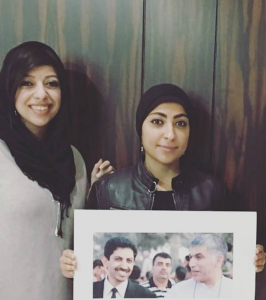
Zainab and Maryam Al-Khawaja
Seven years ago this month, renowned human rights defender and former Index award winner Abdulhadi Al-Khawaja was dragged from his home in Bahrain, tortured, tried in a military court, and sentenced to life in prison for his peaceful role in 2011 protests. Today, 5 April, on Al-Khawaja’s 57th birthday, the undersigned human rights organisations call for his immediate release and for all human rights defenders jailed in Bahrain to be freed.
On Monday 9 April, human rights organisations, friends, and supporters will join two of Al-Khawaja’s daughters, Zainab and Maryam Al-Khawaja, for two events in London:
Protest: Bahraini Embassy, 1pm
Call on the Bahraini Government to release Abdulhadi Al-Khawaja
30 Belgrave Square, Knightsbridge, London SW1X 8QB
Front Line Defenders has been organising monthly protests at the Embassy since January 2018
Conversation with Zainab and Maryam Al-Khawaja, 6:30pm
Hosted by Front Line Defenders and ARTICLE 19
Free Word Centre, 60 Farringdon Road, London, EC1R 3GA
Abdulhadi Al–Khawaja is an internationally-known Bahraini-Danish human rights defender who is the founder and former President of the Bahrain Centre for Human Rights (BCHR), established in 2002, and a Founding Director of the Gulf Centre for Human Rights (GCHR), established in 2011. He was Middle East and North Africa Protection Coordinator for Front Line Defenders until February 2011, when he resigned during the popular movement in Bahrain.
He was violently arrested on 9 April 2011 and charged in connection with his peaceful human rights activities. This was followed by brutal torture, resulting in a broken jaw and requiring several operations, then finally by an unfair trial grossly violating international standards for fair trials and due process. He undertook a number of hunger strikes to protest torture and poor prison conditions.
Al-Khawaja is one of a group of 13 human rights defenders and political activists (the Bahrain 13) sentenced to lengthy prison terms solely for exercising their right to freedom of expression, association and peaceful assembly. Following a grossly unfair trial, Al-Khawaja was sentenced by the National Safety court (a military court) on 22 June 2012 to life in prison, along with seven other members of the Bahrain 13. As the sentence was being pronounced, Al-Khawaja raised his fist saying: “We will continue on the path of peaceful resistance.”
The current situation in Bahrain is dire. The vast majority of human rights defenders are in jail, in exile, under travel ban, or enduring severe threats and intimidation as a result of their peaceful work. Dozens have been abused and tortured. International NGOs and journalists have been prevented from visiting Bahrain to document the government’s ongoing human rights abuses.
At the same time, Bahrain continues to host events such as the Formula One 2018 Gulf Air Bahrain Grand Prix from 06 to 08 April, during which time any protests are sure to be met with reprisals.
Just two days ahead of the Formula One, on 04 April 2018 at 02am, Lars Aslan Rasmussen, a Danish Member of Parliament, and Brian Dooley, GCHR Advisory Board member, arrived in Bahrain in an attempt to visit Al-Khawaja in prison. They were refused entry on the basis that they posed a “security risk” and deported.
We the undersigned call on the authorities in Bahrain to:
- Immediately and unconditionally free Abdulhadi Al-Khawaja and all other human rights defenders from prison;
- Provide proper access to medical care and sanitary conditions in prison;
- Allow Abdulhadi Al-Khawaja and all prisoners proper access to families;
- Allow international NGOs and journalists free access to Bahrain, including for the purposes of visiting detained human rights defenders; and
- Guarantee in all circumstances that human rights defenders in Bahrain are able to carry out their legitimate activities without fear of reprisals and free of all restrictions including judicial harassment.
Signed by:
Americans for Democracy & Human Rights in Bahrain (ADHRB)
Arabic Network for Human Rights Information (ANHRI)
Bahrain Center for Human Rights (BCHR)
Bahrain Institute for Rights and Democracy (BIRD)
English PEN
European Center for Democracy and Human Rights (ECDHR)
FIDH, under the Observatory for the Protection of Human Rights Defenders
Front Line Defenders
Gulf Centre for Human Rights (GCHR)
IFEX
Index on Censorship
PEN International
World Organisation Against Torture (OMCT), under the Observatory for the Protection of Human Rights Defenders








